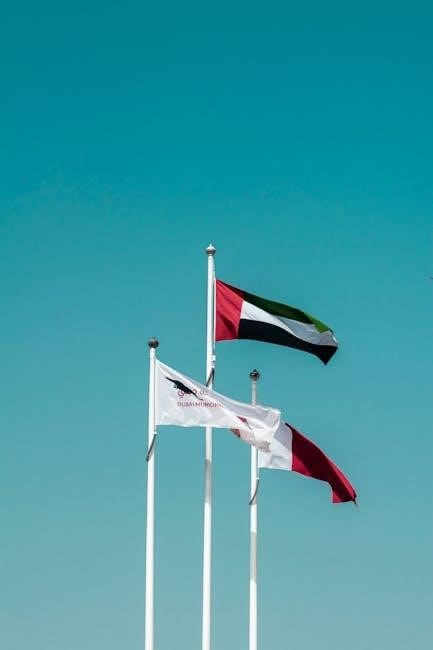In relationships, red flags signal potential issues like possessiveness or dishonesty, while green flags highlight positive traits such as respect and open communication; Recognizing these indicators helps foster healthier, more fulfilling connections.
What Are Red Flags in Relationships?
Red flags in relationships are warning signs that indicate potentially unhealthy or abusive behaviors. They can include possessiveness, jealousy, disrespect, manipulation, dishonesty, or disregard for boundaries. Financial red flags, such as irresponsible spending or secrecy about money, may also arise. Additionally, a lack of communication, emotional unavailability, or a negative attitude toward personal growth can signal deeper issues. These behaviors often escalate over time and can lead to toxic or harmful dynamics. Recognizing red flags early on is crucial for protecting your well-being and ensuring a healthy, balanced relationship. Ignoring them may result in emotional, mental, or even physical harm;
What Are Green Flags in Relationships?
Green flags in relationships are positive indicators of healthy, thriving dynamics. They signify respect, empathy, and mutual support. Examples include open and honest communication, active listening, and valuing each other’s opinions. A partner who respects boundaries, encourages personal growth, and demonstrates emotional availability is showing green flags. Healthy conflict resolution, independence, and a positive attitude are also key signs. Green flags foster trust, security, and a sense of safety in the relationship. They highlight a partner’s commitment to nurturing the connection and ensuring both individuals feel valued and heard. Recognizing these positive traits can help build a strong, fulfilling relationship.
Why Identifying These Flags Is Crucial for Healthy Relationships
Recognizing red and green flags is essential for building and maintaining healthy relationships. Red flags, such as possessiveness or dishonesty, can indicate toxicity and potential harm, while green flags, like respect and empathy, signal a positive foundation. Identifying these signs early allows individuals to address issues before they escalate, fostering trust and emotional safety. A balanced awareness of both flags helps set boundaries, communicate effectively, and make informed decisions. Prioritizing these indicators promotes personal well-being and ensures relationships grow on a foundation of mutual respect and understanding, leading to more fulfilling and lasting connections.
Understanding Red Flags in Relationships
Red flags are warning signs indicating unhealthy behaviors in relationships, such as possessiveness, manipulation, or disrespect. Recognizing them early can prevent emotional harm and toxicity.
Possessiveness and Jealousy
Possessiveness and excessive jealousy are significant red flags in relationships. They often stem from insecurity and can escalate into controlling behavior, undermining trust and personal freedom. A partner who constantly monitors your actions, becomes angry when you’re unreachable, or questions your interactions with others may be crossing healthy boundaries. While caring about a partner is natural, possessiveness can lead to emotional suffocation and isolation. It’s important to recognize these signs early, as they may indicate a deeper issue with respect and boundaries. Addressing these behaviors openly is crucial to maintaining a balanced and respectful relationship.
Disrespect and Controlling Behavior
Disrespect and controlling behavior are red flags that can erode a relationship’s foundation. When a partner frequently dismisses your opinions, mocks your feelings, or dictates how you should act, it creates an unhealthy power imbalance. Controlling behavior may include limiting your access to friends, family, or hobbies, under the guise of care. Disrespect can manifest as constant criticism or ignoring boundaries, making you feel undervalued. Such actions often escalate over time, leading to emotional distress and loss of autonomy. Recognizing these patterns early is vital to protect your well-being and maintain a relationship built on mutual respect and equality.
Lack of Communication and Emotional Unavailability

Lack of communication and emotional unavailability are significant red flags in relationships. When a partner consistently avoids meaningful conversations, dismisses your emotions, or seems distant, it can create feelings of isolation and disconnection. Emotional unavailability often stems from unresolved past traumas or fear of intimacy, making it difficult for the person to connect deeply. This red flag can manifest as ignoring your needs, avoiding vulnerability, or showing indifference to your feelings. Over time, this can lead to emotional exhaustion and dissatisfaction; Addressing these issues early is crucial, as healthy relationships thrive on open communication and mutual emotional support.
Manipulation and Gaslighting
Manipulation and gaslighting are harmful red flags in relationships. Manipulation involves using deceit or coercion to control a partner’s thoughts or actions, while gaslighting distorts reality, making the victim doubt their perceptions. These behaviors often manifest as blame-shifting, denial of agreed-upon facts, or minimizing harmful actions. Over time, this can erode a person’s self-confidence and independence. Gaslighting, in particular, can make someone feel powerless or question their sanity. Recognizing these tactics is crucial, as they undermine trust and equality in a relationship. Addressing these behaviors early is essential to protect emotional well-being and maintain a healthy, balanced partnership.
Dishonesty and Infidelity
Dishonesty and infidelity are significant red flags that can severely damage trust and intimacy in a relationship. Dishonesty may involve lying about small or significant matters, creating a sense of unreliability. Infidelity, whether emotional or physical, breaches the commitment expected in a partnership. These actions often lead to feelings of betrayal and insecurity. Once trust is broken, rebuilding it can be challenging. Recognizing patterns of dishonesty or infidelity early on is crucial, as they can indicate deeper issues with accountability and respect. Addressing these behaviors openly and honestly is essential to determine if the relationship can move forward healthily.

Financial Red Flags
Financial red flags in relationships often signal deeper issues with trust and responsibility. These may include secretive spending habits, avoidance of financial discussions, or reliance on a partner for monetary support without contributing fairly. Dishonesty about debt, excessive borrowing, or pressuring a partner for financial favors can create strain and resentment. It’s important to ensure open communication about financial goals and expectations to maintain a balanced and respectful partnership. Ignoring these signs can lead to long-term financial and emotional challenges, making it crucial to address them early on to foster a healthy and stable relationship dynamic.
Disregard for Boundaries
Disregard for boundaries is a significant red flag, indicating a lack of respect for personal space, needs, and limits. When someone consistently ignores or pushes past established boundaries, it can lead to emotional distress and a loss of autonomy. Healthy relationships thrive on mutual respect, and violating boundaries often signals deeper issues like control or entitlement. It’s important to communicate clearly and enforce boundaries firmly to maintain a balanced and respectful dynamic. Ignoring this red flag can erode trust and create an unhealthy power imbalance in the relationship. Recognizing and addressing boundary disregard early on is crucial for fostering a secure and respectful connection.
Negative Attitude Toward Personal Growth
A negative attitude toward personal growth is a concerning red flag, as it suggests a lack of interest in self-improvement or supporting a partner’s development. This can manifest as discouraging ambitions, showing resentment toward progress, or dismissing the importance of learning and evolving. Such behavior can hinder both individual and shared growth, leading to stagnation and dissatisfaction. Healthy relationships thrive when both partners encourage and celebrate each other’s efforts to improve and achieve goals. A partner who undermines or belittles personal growth not only stifles potential but also creates an unsupportive and limiting environment. Recognizing this red flag is essential for fostering a nurturing and progressive relationship dynamic.
Understanding Green Flags in Relationships
Green flags in relationships are positive indicators of healthy behaviors, such as respect, empathy, and open communication, fostering trust and emotional safety for both partners.
Open and Honest Communication
Open and honest communication is a key green flag in relationships, fostering trust and understanding. Both partners feel comfortable expressing their thoughts and feelings without fear of judgment or retaliation. Active listening and clarity in conversations ensure that needs and concerns are addressed promptly. This transparency builds a strong foundation, allowing conflicts to be resolved constructively. Healthy communication also involves respecting each other’s opinions, even when they differ, which strengthens the bond and promotes mutual respect. It’s a clear indicator of a partner’s commitment to a balanced and fulfilling relationship, making it easier to navigate challenges together.
Mutual Respect and Value for Opinions
Mutual respect and valuing each other’s opinions are essential green flags in a relationship. When both partners consistently show respect, it creates a safe and supportive environment where feelings and perspectives are acknowledged. This fosters equality and teamwork, as decisions are made collaboratively rather than dictatorially. Respecting opinions, even during disagreements, demonstrates maturity and empathy. It encourages open dialogue and strengthens the emotional connection. A partner who values your thoughts and beliefs signals a healthy, balanced relationship. This mutual regard promotes personal growth and ensures both individuals feel heard and appreciated, laying a solid foundation for long-term harmony and understanding.
Emotional Support and Empathy
Emotional support and empathy are powerful green flags, indicating a partner’s ability to understand and share your feelings. A supportive partner actively listens, validates your emotions, and offers comfort during challenging times. Empathy fosters a deeper connection, helping both individuals feel seen and valued. This trait is crucial for navigating life’s ups and downs together. When your partner shows genuine care for your well-being and celebrates your successes, it strengthens trust and intimacy. Emotional support also encourages personal growth, as a caring partner will help you overcome setbacks and achieve your goals. Such behaviors are key indicators of a nurturing and healthy relationship.
Healthy Conflict Resolution
Healthy conflict resolution is a significant green flag, demonstrating a couple’s ability to address disagreements constructively. It involves active listening, respect, and a focus on finding solutions rather than assigning blame. When both partners can express their feelings calmly and work together to resolve issues, it strengthens trust and intimacy. Avoiding contempt, defensiveness, or stonewalling is crucial, as these behaviors can escalate conflicts. Instead, seeking mutual understanding and compromise fosters a positive environment for growth. Healthy conflict resolution shows maturity and a commitment to the relationship’s well-being, allowing both individuals to feel heard and valued. This trait is essential for long-term harmony and satisfaction.
Independence and Encouragement of Personal Growth
Independence and encouragement of personal growth are strong green flags in a relationship. A partner who supports your individual goals, hobbies, and aspirations fosters a healthy dynamic. Maintaining one’s identity outside the relationship is crucial, as it prevents codependency and promotes self-esteem. When both individuals encourage each other’s growth, it creates a nurturing environment where both can thrive. This includes respecting personal space, celebrating achievements, and offering constructive feedback. Unlike red flags like control or jealousy, independence and growth-oriented behavior demonstrate trust and respect. Healthy relationships thrive when partners value each other’s autonomy and contribute to mutual development; This balance ensures a fulfilling and evolving connection.
Clear Intentions and Commitment
Clear intentions and commitment are significant green flags in a relationship. A partner who openly communicates their desires and goals demonstrates reliability and seriousness. Unlike red flags like ambiguity or hesitation, clear intentions foster trust and stability. When both individuals are committed to the relationship’s future, it creates a solid foundation for growth. This transparency eliminates misunderstandings and builds confidence, allowing the relationship to flourish. Healthy commitment involves mutual dedication without suffocation, ensuring both partners feel secure and valued. Clear intentions and commitment are essential for navigating life’s challenges together and maintaining a strong, enduring connection. They signify a partner’s willingness to invest in the relationship’s success.
Respect for Boundaries
Respect for boundaries is a crucial green flag in relationships, indicating a partner’s understanding of personal space and emotional limits. When boundaries are honored, it fosters trust, safety, and mutual respect. A partner who respects your boundaries values your autonomy and avoids pressuring you into uncomfortable situations. This includes respecting physical, emotional, and intellectual limits. Healthy relationships thrive when both individuals feel their boundaries are acknowledged and upheld. In contrast, disregarding boundaries is a red flag, often leading to controlling or manipulative behavior. Respecting boundaries ensures a balanced and harmonious connection, allowing both partners to grow individually and together. It’s a foundation of a healthy, thriving relationship. Respect for boundaries is essential for long-term satisfaction and mutual well-being.
Positive Attitude and Gratitude
A positive attitude and gratitude are powerful green flags in relationships, fostering a supportive and uplifting environment. When a partner consistently maintains optimism, even in challenging situations, it creates a resilient and encouraging dynamic. Expressing genuine gratitude, whether for small gestures or significant efforts, strengthens emotional bonds and fosters appreciation. This mindset helps navigate life’s difficulties together, promoting mutual growth and happiness. In contrast to red flags, which often drain energy, positive attitudes and gratitude enrich relationships, ensuring both partners feel valued and respected. Cultivating these traits builds a strong foundation for long-term satisfaction and resilience in any relationship. Gratitude and positivity are key to a thriving connection.

Recognizing Red Flags in Different Relationship Stages
Red flags can emerge at various stages, from subtle signs in early dating to more severe issues in long-term relationships or friendships, requiring vigilant awareness and timely action.
Red Flags in the Early Stages of Dating
In the early stages of dating, red flags may include possessiveness, constant checking in, or excessive jealousy. These behaviors can signal controlling tendencies or insecurity. A partner who discourages hobbies, friendships, or personal growth early on may indicate unhealthy patterns. Rash decision-making, such as pressuring commitment too soon, can also be a warning sign. Ignoring these signs can lead to more severe issues later. Recognizing these red flags early allows individuals to assess compatibility and avoid potential harm. It’s crucial to prioritize personal well-being and not overlook behaviors that may escalate into toxic dynamics down the line.
Red Flags in Long-Term Relationships
In long-term relationships, red flags often emerge as patterns of behavior that undermine trust and intimacy. Emotional unavailability or a lack of effort to maintain connection can signal deeper issues. Manipulation, gaslighting, or consistent disregard for boundaries are significant red flags that may worsen over time. Financial irresponsibility, secrecy, or controlling behavior regarding money can also strain the relationship. A partner’s negative attitude toward personal growth or unwillingness to address conflicts healthily may indicate stagnation. Over time, these red flags can lead to emotional distress and imbalance, making it crucial to address them early to prevent the relationship from becoming toxic. Open communication and mutual respect are essential to navigate these challenges effectively.

Red Flags in Friendships
Red flags in friendships can indicate unhealthy dynamics that may harm your emotional well-being. These include consistent unreliability, such as frequently canceling plans or failing to follow through on commitments. A friend who only reaches out when they need something, showing little interest in your life, is another red flag. Disrespect for boundaries, such as pressuring you into uncomfortable situations, can also be concerning. Additionally, a friend who frequently criticizes or dismisses your feelings may not be emotionally supportive. If the friendship feels one-sided, with you always initiating contact, it may signal a lack of investment. Addressing these red flags early can help preserve the health of the friendship or indicate when it’s time to reevaluate the relationship.

Recognizing Green Flags in Different Relationship Stages
Green flags vary across relationship stages, reflecting healthy behaviors. In early dating, active listening and respect are key. In long-term relationships, commitment and empathy shine. Friendships thrive on trust and mutual support, ensuring connections remain nurturing and positive at every stage.
Green Flags in the Early Stages of Dating
In the early stages of dating, green flags include open and honest communication, active listening, and respect for boundaries. A partner who values your opinions, encourages your passions, and shows genuine interest in your life is a positive sign. Consistency in their words and actions, along with a willingness to resolve conflicts respectfully, builds trust. They prioritize getting to know you deeply, fostering emotional connection and comfort. These behaviors indicate emotional maturity and a foundation for a healthy relationship. Recognizing these green flags early on can help you identify a partner who is invested in your well-being and growth, creating a strong base for a fulfilling connection.
Green Flags in Long-Term Relationships
In long-term relationships, green flags include sustained commitment, mutual support, and shared growth. A partner who remains emotionally available, communicative, and respectful over time is a strong indicator of a healthy relationship. They take responsibility for their actions, show appreciation, and prioritize your well-being. Shared responsibilities, financial transparency, and adaptability to life changes further highlight a nurturing partnership. Long-term green flags also involve ongoing efforts to understand and support each other’s goals, fostering a sense of teamwork. These consistent positive behaviors create a foundation of trust and stability, ensuring the relationship continues to thrive and evolve over time.
Green Flags in Friendships
In friendships, green flags include traits like active listening, empathy, and consistent support. A friend who respects boundaries, encourages personal growth, and celebrates your successes is a positive influence. They communicate openly, resolve conflicts maturely, and show genuine care for your well-being. Reliability, trustworthiness, and a willingness to apologize when needed are also strong green flags. Healthy friendships thrive on mutual respect, shared values, and a balance of give-and-take. These positive behaviors foster a sense of safety and connection, making the friendship nurturing and fulfilling. Recognizing these green flags helps you cultivate strong, meaningful relationships that enrich your life.

The Importance of Balance in Relationships
Balance in relationships involves recognizing both red and green flags, fostering harmony by addressing concerns and nurturing positive traits, ensuring emotional and mental well-being for all involved.
Can Green Flags Outweigh Red Flags?
While green flags like open communication and respect are crucial, they cannot always outweigh severe red flags such as manipulation or dishonesty. Healthy relationships require addressing both aspects. Green flags can strengthen a connection, but ignoring red flags may lead to emotional harm. It’s essential to evaluate the severity and frequency of red flags. If they indicate a pattern of toxicity, green flags alone may not be enough to sustain a healthy relationship. Balancing both is key to fostering trust and mutual growth, ensuring that positive traits are not overshadowed by harmful behaviors.
Can Red Flags Outweigh Green Flags?
Red flags, such as manipulation or dishonesty, can overshadow green flags like respect and support if they persistently undermine trust and safety. While green flags foster connection, chronic red flags often signal deeper issues that may harm the relationship’s foundation. Ignoring severe red flags can lead to emotional distress, making it challenging to sustain a healthy partnership. It’s crucial to address red flags promptly, as their impact can outweigh even strong green flags over time. Prioritizing emotional well-being and setting clear boundaries ensures that red flags do not dominate the relationship dynamic, allowing green flags to thrive in a balanced and nurturing environment.
How to Strike a Healthy Balance
Striking a healthy balance involves acknowledging both red and green flags without ignoring either. Focus on fostering open communication to address concerns and nurture positive traits. Set clear boundaries to protect your well-being while encouraging mutual growth. Prioritize self-awareness to recognize patterns and make informed decisions. By weighing the severity of red flags against the strength of green flags, you can create a relationship built on trust, respect, and emotional safety. This balance ensures that both partners feel valued and heard, fostering a resilient and fulfilling connection.

Navigating and Addressing Red Flags
Addressing red flags requires open communication, setting boundaries, and making informed decisions to protect emotional well-being and foster healthier connections.
How to Communicate Concerns About Red Flags
Addressing red flags requires thoughtful communication. Start by choosing the right time and place to discuss concerns calmly. Use “I” statements to express feelings without blame, fostering a constructive dialogue. For instance, say, “I feel worried when…” instead of “You always…”. Listen actively to their perspective to understand their viewpoint. Be specific about the behavior causing concern and how it affects you. Avoid general accusations and focus on finding solutions together. If the issue persists or worsens, reassess the relationship’s health. Open communication can either resolve issues or clarify the need for boundaries, helping to protect your emotional well-being.
Setting Boundaries to Protect Your Well-Being
Setting boundaries is essential to safeguard your emotional and mental health in a relationship. Clearly communicate your limits and expectations to avoid emotional drain or disrespect. Be specific about what you are and aren’t comfortable with, whether it’s personal space, time, or emotional needs. Consistently enforce these boundaries without hesitation, as they are non-negotiable for a healthy relationship. If a partner disregards your boundaries repeatedly, it may signal a red flag. Remember, boundaries are not about controlling others but protecting yourself. Prioritize your well-being by staying firm yet respectful. Healthy relationships thrive when both partners respect and honor each other’s boundaries, fostering trust and mutual understanding.
When to Walk Away From a Relationship
Knowing when to walk away from a relationship is crucial for your emotional well-being. If red flags persist, such as consistent disrespect, manipulation, or emotional harm, it may be time to reevaluate; Staying in a toxic relationship can lead to mental health issues and a loss of self-worth. Trust your instincts if the relationship feels draining or unhealthy. Prioritize your well-being and consider walking away when green flags are absent and red flags dominate. Remember, a healthy relationship should uplift and support you, not cause constant stress or pain. Your happiness and safety are worth more than holding onto an unhealthy connection.
Final Thoughts on Red and Green Flags
Recognizing red and green flags is vital for navigating relationships effectively. Red flags, such as possessiveness or dishonesty, serve as warnings of potential harm, while green flags, like respect and empathy, indicate healthy traits. Striking a balance is key—green flags don’t negate red flags, and ignoring red flags can lead to emotional distress. By staying aware and prioritizing communication, you can foster relationships that support your well-being. Remember, healthy connections thrive on mutual respect, trust, and growth. Empower yourself to recognize these signals and make decisions that align with your values and aspirations for a fulfilling relationship.
Encouragement to Prioritize Healthy Relationships
Prioritizing healthy relationships is essential for emotional well-being and personal growth. By focusing on green flags—such as mutual respect, trust, and empathy—you can build connections that uplift and support you. Encourage open communication, set boundaries, and seek partners who value your worth. Healthy relationships foster joy, stability, and shared growth. Don’t settle for less than what you deserve, and remember, your well-being is worth investing in. Cultivate relationships that inspire positivity and alignment with your values, ensuring a foundation of trust and respect for a fulfilling life together.
